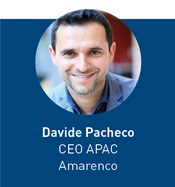Companies news • Analyses & Studies • Portraits • Publications
CEO Sustainability Series |Davide Pacheco, CEO APAC, Amarenco

As part of the Sustainable Business initiative, the French Chamber of Commerce in Singapore presents a leadership interview series where we invite CEOs and key executives to discuss crucial management qualities that drive successful sustainable transformation
Question 1: How is sustainability influencing the energy sector?
The energy sector is directly involved in and responsible for the carbon emissions that contribute to climate change. Today, the urgent question is how to act in a pragmatic way to remedy this. Energy is at the heart of processes and industrial models that are changing. Despite the rapid implementation of solar energy, this evolution is slow because it conditions the profound mutation of ecosystems as well as the visible returns of experience.
All sectors are concerned and must participate in this transformation. Agrisolarity highlights the virtue of co-activity between sustainable energy production, agricultural yield and optimisation of land use, but this requires a close synergy between all the players in the sector to make these models a success from an economic and ecological point of view. The manufacturers we equip with photovoltaic shading systems see sustainable energy savings while improving the comfort of their customers.
Our PPAs (Power Purchase Agreements) help to improve the models of our industrial customers, who can then comply with changing regulations and significantly reduce their carbon footprint. They participate in the evolution of their value chain (scope 2 and 3 GHG protocol, RE100...) and position themselves as virtuous and responsible models. Renewable
energy is the starting point for this necessary and possible change.
Q2 : How do you see expectations and attitudes towards sustainability changing among your employees, customers, and partners? And what are the impact on your organisation?
We have a very proactive governance in terms of ESG policy. We communicate a lot on the evolution of our processes to be in compliance with 8 SDGs, whose proper fulfilment we monitor. These criteria are integrated into the investment decisions and the PPAs signed. With what we call our echo-programmes, we are increasingly developing infrastructures that have positive impacts on carbon reduction, biodiversity, creating local jobs and participating in the redevelopment of food sovereignty.
It is currently too early to measure the impact of these organisational choices, and the same goes for our partners, as feedback is essential to move our models forward. These models will accelerate in the coming periods because beyond compliance and short-term ROI, economic actors know the importance of their energy choices, particularly for them
and their eco-systems, to ensure the sustainability of their activity while improving their image as responsible and committed actors. Everyone has something to gain and the planet comes first.
Q3 : What are some of the biggest sustainability issues you’ve faced and how did you tackle all these sets of challenges?
Our major challenge lies in the establishment of real synergies between the players in the sectors. This affects the supply chains, whose proper development and compliance must be monitored. The other major challenge concerns investment requirements, which remain high but whose potential and returns can be guaranteed. We are helped by solid partners who believe in the necessary reconciliation of the economy and ecology. It is up to us to multiply the virtuous models to demonstrate that this is the right direction. We are perfectly convinced of this.

This interview was conducted with Davide Pacheco, CEO APAC, Amarenco
April 2023| French Chamber of Commerce in Singapore


